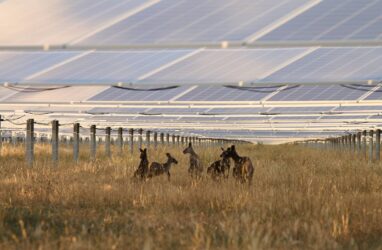Feed aggregator
NbS offer lifeline for India’s small farmers, but policy hurdles remain, conference hears
Euro Markets: Midday Update
Non-profit urges UK bank to close financing loophole for oil and gas companies
Biochar dominates Q1 CDR purchases as new buyers enter market
INTERVIEW: EU’s 2040 climate target must be met domestically – without Article 6 credits, MEP says
FEATURE: US-based ERW project developer awarded $50 mln for first place in XPRIZE competition
A silent majority of the world’s people wants stronger climate action. It’s time to wake up | Mark Hertsgaard and Kyle Pope
About 89% of the public want their governments to do more to tackle the climate crisis – but don’t know they’re the majority
- The Guardian is joining forces with dozens of newsrooms around the world to launch the 89% Project – and highlight the fact that the vast majority of the world’s population wants climate action. Read more
A superpower in the fight against global heating is hiding in plain sight. It turns out that the overwhelming majority of people in the world – between 80% and 89%, according to a growing number of peer-reviewed scientific studies – want their governments to take stronger climate action.
As co-founders of a non-profit that studies news coverage of climate change, those findings surprised even us. And they are a sharp rebuttal to the Trump administration’s efforts to attack anyone who does care about the climate crisis.
Mark Hertsgaard and Kyle Pope are the co-founders of the global journalism collaboration Covering Climate Now
Continue reading...Last of 640 battery packs in place at one of Australia’s biggest storage projects
The post Last of 640 battery packs in place at one of Australia’s biggest storage projects appeared first on RenewEconomy.
‘Alarming’ increase in levels of forever chemical TFA found in European wines
Wines produced after 2010 showed steep rise in contamination of trifluoroacetic acid, analysis finds
Levels of a little-known forever chemical known as TFA in European wines have risen “alarmingly” in recent decades, according to analysis, prompting fears that contamination will breach a planetary boundary.
Researchers from Pesticide Action Network Europe tested 49 bottles of commercial wine to see how TFA contamination in food and drink had progressed. They found levels of trifluoroacetic acid (TFA), a breakdown product of long-lasting Pfas chemicals that carries possible fertility risks, far above those previously measured in water.
Continue reading...Nestle partners on global cocoa project to cut 1.5 mln tonnes of CO2 by 2055
Renewables giant says Australia among easiest places on planet to be green and competitive
The post Renewables giant says Australia among easiest places on planet to be green and competitive appeared first on RenewEconomy.
Election 2025: will the Albo party win it? The polls are never wrong! | First Dog on the Moon
Take that Antony Greem
- Sign up here to get an email whenever First Dog cartoons are published
- Get all your needs met at the First Dog shop if what you need is First Dog merchandise and prints
Tracing the worst coral bleaching event in recorded history – video
In early 2023, the planet's worst coral bleaching event began. More than two years later, 80% of the planet's reefs have been affected by successive marine heatwaves hitting ecosystems from the Great Barrier Reef to the Mesoamerican Reef
Continue reading...Sniping koalas from helicopters: here’s what’s wrong with Victoria’s unprecedented cull
Sanctioned Russia and Belarusian wood being smuggled into UK, study suggests
‘Chemical fingerprint’ shows 46% of wood samples certified as sustainable did not come from labelled country of origin
Nearly half of birch wood certified by leading sustainability schemes is misidentified and does not come from the labelled country of origin, according to new testing. The analysis raises fears that large quantities of sanctioned wood from Russia and Belarus are still illegally entering Britain.
New research by World Forest ID, a consortium of research organisations that includes Kew Gardens and the World Resources Institute, scrutinised the accuracy of dozens of harvesting-origin claims on birch products, which had almost entirely been approved by the Forest Stewardship Council (FSC) and Programme for the Endorsement of Forest Certification (PEFC) sustainability schemes.
Continue reading...Giant battery project puts solar component on ice as it focuses on grid stability
The post Giant battery project puts solar component on ice as it focuses on grid stability appeared first on RenewEconomy.
NZ court rejects bid to expand climate case
Nigel Farage thinks net zero is the new Brexit. Starmer can prove him wrong | Rafael Behr
Labour must deliver the green transition voters want, leaving Reform and the Tories on the side of economic decline and dictators
Which former British prime minister described the climate emergency as “a clock ticking to the furious rhythm of hundreds of billions of pistons and turbines and furnaces and engines … quilting the Earth in an invisible and suffocating blanket of CO2”?
The florid style gives it away. You’d guess Boris Johnson even if you’d forgotten that the master of Brexit bombast also had a sideline in net zero evangelism. It wasn’t the most memorable part of his repertoire and it didn’t catch on as a Conservative catechism.
Rafael Behr is a Guardian columnist
Continue reading...Rather than short-term fixes, communities need flexible plans to prepare for a range of likely climate impacts
More than 80% of the world’s reefs hit by bleaching after worst global event on record
An ashen pallor and an eerie stillness all that remains where there should fluttering fish and vibrant colours in the reefscape, one conservationist says
The world’s coral reefs have been pushed into “uncharted territory” by the worst global bleaching event on record that has now hit more than 80% of the planet’s reefs, scientists have warned.
Reefs in at least 82 countries and territories have been exposed to enough heat to turn corals white since the global event started in January 2023, the latest data from the US government’s Coral Reef Watch shows.
Continue reading...





